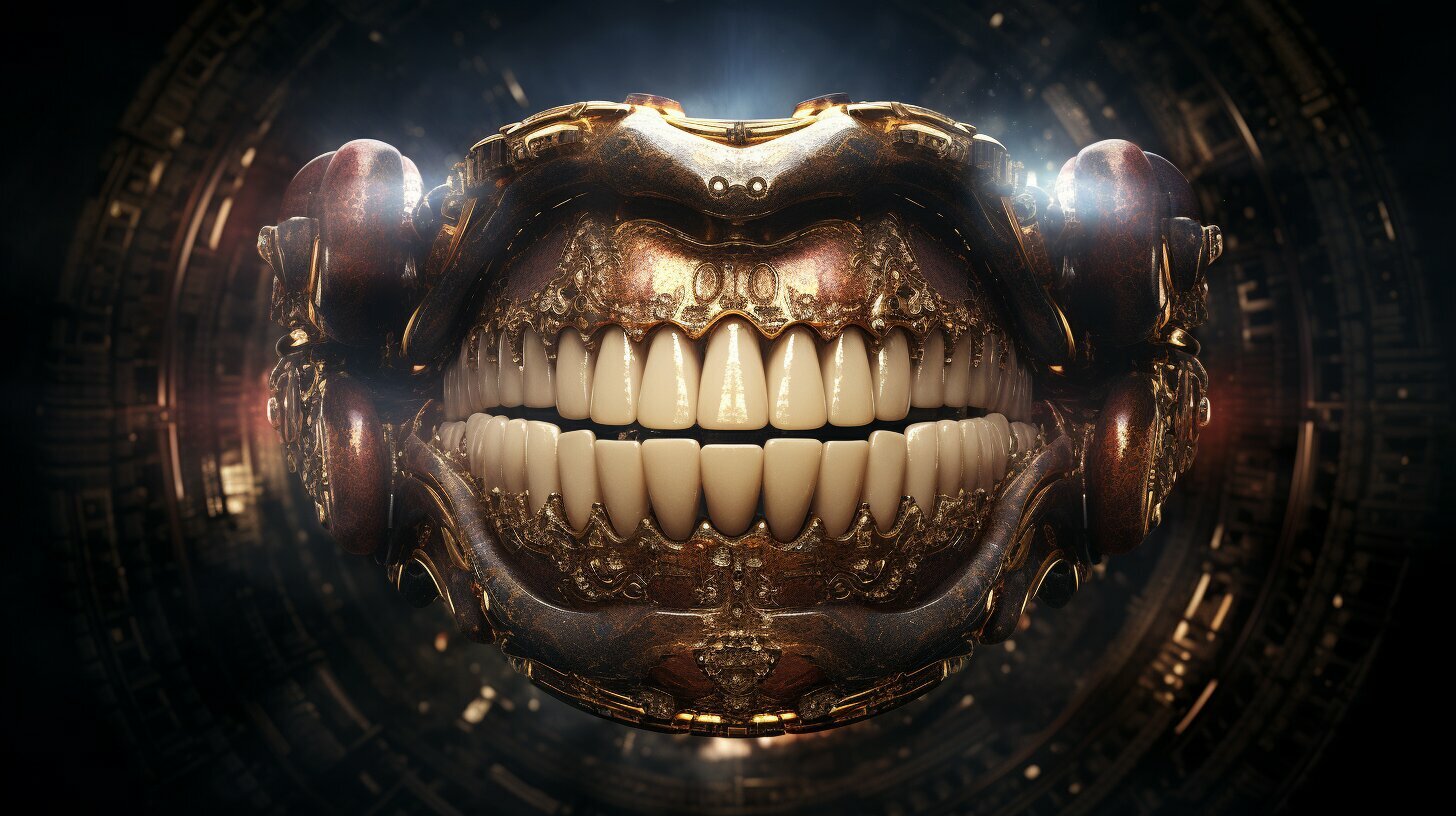Discover Why They Are Called Wisdom Teeth
Have you ever wondered why these third molars are referred to as wisdom teeth? Let’s uncover the intriguing story behind their name.
Key Takeaways:
- Wisdom teeth are the third molars that typically appear between ages 17 and 21.
- The name “wisdom teeth” comes from the belief that they appear during the time when people are thought to gain wisdom.
- In ancient times, wisdom teeth may have been necessary for chewing harder, tougher foods.
- Today, improved dental care and a softer diet have made wisdom teeth less necessary.
- Not everyone needs to have their wisdom teeth removed, as some people can keep them without any issues.
Wisdom teeth, also known as third molars, are the set of teeth that typically appear during adolescence or early adulthood. But have you ever wondered why they are called wisdom teeth?
The name “wisdom teeth” originated from the belief that they usually emerge between ages 17 and 21, a time when individuals are thought to gain wisdom. This correlation between the arrival of these molars and the age at which people traditionally transition into adulthood led to their intriguing name.
In ancient times, wisdom teeth may have served a practical purpose. Back then, the human diet consisted of harder, tougher foods that required a more robust set of teeth to chew. These molars would have played a crucial role in the proper mastication of these challenging meals.
However, as our society has evolved, so too has our diet. With advancements in dental care and a shift towards softer, processed foods, the necessity of wisdom teeth has diminished significantly. In fact, many individuals now experience complications associated with these molars, such as infection, impaction, and tooth crowding.
Consequently, removal of wisdom teeth has become a common practice. Dentists often recommend extraction if there are existing problems or a high likelihood of future issues. However, it’s important to note that not everyone needs to have their wisdom teeth removed. Some individuals can keep them without experiencing any complications.
In conclusion, while the name “wisdom teeth” may have origins linked to the age of wisdom attainment, their practical significance has changed over time. Today, with a softer diet and improved oral hygiene practices, these molars are less necessary and often require removal to prevent potential complications.
Historical Significance of Wisdom Teeth Name
The name “wisdom teeth” carries a rich historical significance, with roots dating back centuries. The term itself originated from the belief that these molars appear at a time when individuals are thought to gain wisdom. In ancient times, the emergence of wisdom teeth was seen as a significant milestone, symbolizing the transition from adolescence to adulthood.
According to historical accounts, several cultures attached spiritual and cultural meanings to the appearance of wisdom teeth. In some societies, it was believed that these molars signaled an individual’s readiness for marriage or entrance into higher stages of life. Other cultures associated wisdom teeth with increased maturity, knowledge, or spiritual awakening.
To further understand the etymology of the term “wisdom teeth,” it is essential to explore the diverse cultural practices and beliefs from around the world. For example, in ancient Greek culture, these molars were referred to as “odontotyrannos,” meaning “tyrant teeth,” as they were notorious for causing pain and discomfort. In contrast, the ancient Mayans considered wisdom teeth a sign of status and beauty, often filing them into decorative shapes.
| Culture | Significance of Wisdom Teeth |
|---|---|
| Greek | Painful and uncomfortable |
| Mayan | Status and beauty |
These historical perspectives offer a glimpse into the fascinating world of wisdom teeth and the cultural context surrounding their name. While the significance of wisdom teeth may have evolved over time, their name continues to intrigue and captivate, connecting us to our ancient ancestors and their understanding of the human experience.
Wisdom Teeth and Age
Have you ever wondered why these molars are specifically referred to as wisdom teeth in relation to age? Wisdom teeth, also known as third molars, typically appear between the ages of 17 and 21. This age range coincides with the transitional phase from adolescence to early adulthood, when individuals are thought to gain wisdom and maturity.
Historically, the term “wisdom teeth” emerged from the belief that these molars represented the development of wisdom and intelligence. Ancient cultures believed that reaching this age milestone marked a significant step towards adulthood, where individuals were expected to possess greater knowledge and understanding of the world.
Furthermore, the correlation between wisdom teeth and age is not solely rooted in cultural beliefs. From a biological standpoint, the eruption of wisdom teeth at this stage of life is influenced by various factors, including the development of the jaw and the shifting of other teeth. The late appearance of these molars can often lead to crowding and misalignment in the mouth, which may require orthodontic intervention.
Wisdom Teeth and Evolution
The background of the term “wisdom teeth” can also be traced back to our ancestors. In ancient times, humans had different dietary habits compared to modern-day eating patterns. They consumed tougher, harder foods that required stronger chewing capabilities, and the presence of the third molars facilitated this process. These molars were necessary for grinding and breaking down fibrous plant materials and tougher meats.
| Wisdom Teeth and Modern Diet | Wisdom Teeth and Ancient Diet |
|---|---|
| With advancements in cooking techniques and food processing, our diet has become significantly softer and easier to consume. As a result, our jaws have evolved to become smaller, making it increasingly common for wisdom teeth to lack the necessary space to erupt properly. | In contrast, our ancestors’ diet consisted of coarse, unprocessed foods that required more intense chewing. The presence of wisdom teeth was essential for efficient mastication, contributing to their overall survival and well-being. |
In conclusion, the term “wisdom teeth” is deeply rooted in both cultural beliefs and biological aspects. These molars, which appear during the late adolescence and early adulthood stages, have historically been associated with gaining wisdom and maturity. However, with changes in our diet and advancements in dental care, wisdom teeth are no longer necessary for the majority of individuals. If these molars cause problems or are likely to cause issues in the future, their removal is a common practice in modern dentistry. However, it’s important to note that not everyone needs to have their wisdom teeth removed, as some people can keep them without any issues.
The Appearance of Wisdom Teeth
The appearance of wisdom teeth sets them apart from other teeth, but what makes them so special? These third molars, also known as “wisdom teeth,” are the last teeth to erupt in the mouth, typically appearing between the ages of 17 and 21. Their delayed arrival, combined with their size and location, makes them unique.
Wisdom teeth are characterized by their large size and distinctive shape. Unlike the other molars in the mouth, they often have a more irregular surface and may have multiple roots. Additionally, wisdom teeth can sometimes be impacted, meaning they do not fully emerge from the gums due to lack of space. This can cause discomfort and potentially lead to oral health issues.
If we were to compare wisdom teeth to the other molars, it becomes evident that they stand out in terms of appearance. The table below illustrates some key differences:
| Characteristic | Wisdom Teeth | Other Molars |
|---|---|---|
| Size | Larger | Smaller |
| Shape | Irregular | More uniform |
| Roots | May have multiple roots | Usually have two or three roots |
As shown in the table, wisdom teeth tend to be larger, have a more irregular shape, and may have multiple roots compared to the other molars. These physical differences contribute to their unique appearance and the potential challenges they can present.
The Significance of Wisdom Teeth in Ancient Times
Wisdom teeth played a crucial role in the lives of our ancestors, but how did they become associated with wisdom? These third molars typically appear between the ages of 17 and 21, a time when individuals are thought to gain wisdom and transition into adulthood. This connection between the appearance of these teeth and the concept of wisdom led to their name: wisdom teeth.
In ancient times, when our ancestors relied on a diet of harder, tougher foods, these molars were essential for chewing and grinding. They played a vital role in processing the fibrous plants and tough meats that made up their meals. The ability to efficiently chew these foods was crucial for survival and overall health.
As time went on and humans evolved, our diet changed. With the advent of modern cooking techniques and advancements in food processing, our diet has become softer and more refined. We no longer rely on the same kind of heavy-duty chewing power that our ancestors needed. Consequently, wisdom teeth have become less necessary for our diet and oral function.
Today, improved dental care and increased awareness of oral health have also influenced the perception of wisdom teeth. Often, these molars do not have adequate space to fully emerge, leading to problems such as impaction, infection, and tooth crowding. As a result, many dental professionals recommend the removal of wisdom teeth to prevent these issues and maintain oral health.
Wisdom Teeth vs. Modern Diet
With the evolution of diets, the role of wisdom teeth has undergone a significant shift. In ancient times, when our ancestors consumed harder, tougher foods, these molars played a crucial role in chewing and grinding. However, as our diets have become increasingly processed and refined, the need for wisdom teeth has diminished.
Our modern diet, characterized by softer and easier-to-chew foods, no longer requires the same level of mastication provided by these third molars. As a result, wisdom teeth often lack the necessary space to erupt properly and can become impacted or cause crowding in the mouth. This is particularly true in cases where the jaw size has not evolved to accommodate these additional teeth.
For many individuals, the lack of a functional need for wisdom teeth has led to their removal. Dentists often recommend extraction to prevent future problems, such as infections or damage to surrounding teeth. The procedure is typically performed under local or general anesthesia and involves the careful removal of the impacted or partially erupted teeth.
| Common Problems Associated with Wisdom Teeth |
|---|
| Infection |
| Impaction |
| Tooth Crowding |
While extraction is a common course of action, not everyone needs to have their wisdom teeth removed. Some individuals are fortunate enough to have sufficient space in their jaws to accommodate these teeth without any issues. Regular dental check-ups and X-rays can help determine if removal is necessary or if these molars can be safely retained.
In conclusion, the role of wisdom teeth has shifted due to changes in our modern diet. With processed foods replacing harder, tougher options, these molars have become less necessary and often cause problems if they do emerge. While extraction is often recommended, it is important to consult with a dental professional to assess individual circumstances and determine the best course of action.
Problems Associated with Wisdom Teeth
Unfortunately, wisdom teeth can cause a range of problems that often require intervention. These third molars, which typically appear between the ages of 17 and 21, can become impacted, meaning they don’t have enough space to fully emerge or grow properly. This can lead to pain, swelling, and even infection. In some cases, wisdom teeth may only partially erupt, leaving a small opening that can trap food particles and bacteria, leading to gum disease or tooth decay.
Additionally, wisdom teeth can cause crowding in the mouth, pushing against adjacent teeth and disrupting the alignment of the entire dental arch. This can result in a crooked smile, bite problems, and the need for orthodontic treatment. Impacted wisdom teeth can also put pressure on nearby nerves, causing numbness, tingling, or aching in the jaw, face, or even the neck.
If left untreated, these issues can worsen over time and may require additional dental procedures, such as fillings, extractions, or even orthognathic surgery to correct bite problems. Therefore, it is often recommended to have wisdom teeth evaluated by a dentist or oral surgeon, who can determine if intervention is necessary.
| Problems Associated with Wisdom Teeth: |
|---|
| Impaction |
| Pain and swelling |
| Infection |
| Gum disease |
| Tooth decay |
| Crowding |
| Nerve compression |
Expert Quote:
“Wisdom teeth can be a common source of dental problems, and it’s important to address them early on to prevent complications. Regular dental check-ups and X-rays can help identify any issues and determine the best course of action.”
– Dr. Jessica Miller, DMD
Wisdom Teeth Removal
When and why do we consider removing wisdom teeth? Wisdom teeth, also known as third molars, are a set of teeth that typically emerge during adolescence or early adulthood. However, these molars often cause problems such as infection, impaction, and tooth crowding. As a result, many individuals opt to have them removed.
Reasons for Wisdom Teeth Removal:
- Impaction: Wisdom teeth often do not have enough space to fully emerge, leading to impaction. This can cause pain, damage to adjacent teeth, and the development of cysts or tumors.
- Infection: The positioning of wisdom teeth makes them difficult to clean properly, increasing the risk of infection. This can lead to pain, swelling, and other oral health issues.
- Tooth Crowding: Wisdom teeth can exert pressure on adjacent teeth, causing them to shift and become misaligned. This can lead to bite problems and the need for orthodontic treatment.
It is important to note that not everyone needs to have their wisdom teeth removed. Some individuals have enough space in their jaw to accommodate these molars without any issues. However, regular dental check-ups and X-rays are necessary to monitor the development and positioning of wisdom teeth.
In cases where removal is deemed necessary, the procedure is typically performed by an oral surgeon or dentist. Local anesthesia or sedation may be used to ensure comfort during the extraction. The recovery period varies from person to person, but it is common to experience swelling, discomfort, and difficulty eating for a few days following the procedure. Following the post-operative instructions provided by the dental professional is crucial for a smooth recovery.
| Potential Benefits of Wisdom Teeth Removal |
|---|
| Prevention of Problems: Removing wisdom teeth can prevent future complications such as infection, impaction, and tooth crowding. |
| Pain Relief: Extraction can alleviate the pain and discomfort caused by impacted or infected wisdom teeth. |
| Improved Oral Health: Removing problematic wisdom teeth can help maintain overall dental health and prevent issues in adjacent teeth. |
Keeping Wisdom Teeth
While removal is common, there are cases where keeping wisdom teeth is a viable option. Wisdom teeth, also known as third molars, are the last teeth to erupt in the back of the mouth. These molars typically appear during late adolescence or early adulthood, between the ages of 17 and 21.
For some individuals, wisdom teeth grow in without causing any problems. If there is enough space in the mouth and the teeth are properly aligned, they can be functional and healthy just like any other teeth. In such cases, regular dental care, including thorough brushing and flossing, can help maintain the health of the wisdom teeth.
However, it’s important to note that not everyone has enough space in their mouth to accommodate wisdom teeth. In many cases, these molars can become impacted, meaning they are unable to fully emerge from the gums. Impacted wisdom teeth can lead to a range of issues, including pain, infection, and damage to adjacent teeth. In these situations, removal may be necessary to prevent further complications.
It’s crucial to consult with a dental professional to determine the best course of action regarding wisdom teeth. The decision to keep or remove these molars should be based on individual circumstances, such as the position, alignment, and overall health of the teeth. Regular dental check-ups and X-rays can provide valuable information to guide this decision-making process.
The Future of Wisdom Teeth
As our understanding of dental health evolves, what does the future hold for wisdom teeth? These third molars, commonly known as wisdom teeth, have long been a topic of discussion and debate in the field of dentistry. Historically, these teeth were believed to appear during a time when individuals are thought to gain wisdom, typically between the ages of 17 and 21. However, with advancements in dental care and changes in human anatomy, the necessity and function of wisdom teeth have come into question.
Today, wisdom teeth are often considered vestigial and can cause various issues, such as infection, impaction, and tooth crowding. As a result, many dental professionals recommend their removal if they are causing problems or are likely to cause problems in the future. However, not everyone needs to have their wisdom teeth removed, as some individuals are able to keep them without experiencing any issues.
In the future, it is possible that wisdom teeth could become obsolete. With improved oral hygiene practices and a shift towards a softer diet, the need for these additional molars may diminish. As dental health continues to be prioritized, it is likely that the focus will shift towards preventive measures and early detection of dental issues, rather than relying on the removal of wisdom teeth. However, further research and advancements in dental science are needed to fully understand the role and significance of wisdom teeth in our evolving dental landscape.
| Advantages | Disadvantages |
|---|---|
|
|
“The future of wisdom teeth lies in understanding their true purpose and relevance in our modern dental landscape. As dental science continues to advance, we may discover new insights into the role and significance of these molars. It is an exciting time for the field of dentistry, and I look forward to seeing how our understanding of wisdom teeth continues to evolve.”
In conclusion, the future of wisdom teeth is uncertain. While they have played a role in dental health and human evolution for centuries, their importance in our modern world is being questioned. As dental care continues to improve, the need for wisdom teeth removal may decrease, but further research and scientific advancements are necessary to fully understand the complexities of these molars. It is an area of ongoing study and exploration, and only time will tell what the future holds for wisdom teeth.
Cultural Beliefs and Wisdom Teeth
Beyond the biological reasons, wisdom teeth have also held cultural and symbolic meanings across various societies. Throughout history, these molars have been associated with rites of passage, personal growth, and even supernatural powers. Let’s explore some of the intriguing cultural beliefs surrounding wisdom teeth.
The Teeth of Wisdom
In many cultures, the appearance of wisdom teeth is seen as a sign of maturity and the transition into adulthood. The timing of their eruption, typically during late adolescence or early adulthood, often aligns with important milestones in life. In some societies, rituals or ceremonies are performed to celebrate the arrival of wisdom teeth, symbolizing the growth and wisdom gained through life experiences.
A Symbol of Power
Wisdom teeth have also been associated with extraordinary abilities or powers in certain belief systems. For example, in some Native American cultures, it was believed that the emergence of wisdom teeth marked the awakening of spiritual gifts or heightened intuition. In other societies, wisdom teeth were seen as a connection to ancestral wisdom and ancestral spirits.
Superstitions and Folklore
Superstitions surrounding wisdom teeth vary across cultures. In some countries, it is believed that keeping a wisdom tooth brings good luck, while others believe that holding onto them can bring bad luck or cause illness. Folklore also tells tales of the tooth fairy, who would take wisdom teeth and leave a small reward in return, much like with baby teeth. These legends add a touch of magic and wonder to the experience of losing wisdom teeth.
| Belief | Culture | Meaning |
|---|---|---|
| Coming of Age | Various | Symbolizes maturity and transition into adulthood. |
| Supernatural Powers | Native American and others | Associated with spiritual gifts and ancestral wisdom. |
| Superstitions | Global | Beliefs in luck, fortune, and the tooth fairy. |
While cultural beliefs surrounding wisdom teeth may hold different meanings in different societies, they all contribute to the rich tapestry of human history and tradition. Whether celebrated as a sign of wisdom and personal growth or viewed with superstition and wonder, wisdom teeth continue to hold fascination and intrigue across the globe.
Wisdom Teeth in Popular Culture
From ancient folklore to modern media, wisdom teeth have captured the imagination of artists and storytellers. These enigmatic molars have been the subject of countless legends, symbolizing both wisdom and hardship. In literature, wisdom teeth often serve as a metaphorical representation of personal growth and maturity. They are portrayed as a rite of passage, signifying the transition from youth to adulthood.
In popular culture, wisdom teeth have also become a source of humor and entertainment. Their unpredictable and sometimes painful emergence has been the subject of comedic sketches, showcasing the shared experiences and relatable struggles of individuals dealing with these molars. From television shows to online videos, wisdom teeth-related content has garnered a significant following, creating a space for humor and camaraderie among those who have gone through or are about to face the removal of their own wisdom teeth.
The Wisdom of Wisdom Teeth
Despite their reputation as troublesome molars, wisdom teeth also hold a deeper symbolic meaning. They are often associated with the concept of gaining wisdom, as they typically appear during a period of life when young adults are believed to be entering a phase of increased maturity and understanding. In this sense, the name “wisdom teeth” takes on a metaphorical significance, reflecting the idea that with age comes wisdom.
As with many cultural beliefs, the symbolism attached to wisdom teeth can vary across different societies and traditions. For some, these molars are considered a valuable asset, representing a connection to ancestral knowledge and guidance. Others view them as a source of spiritual insight or intuition. Whatever the interpretation, the presence of wisdom teeth in popular culture serves as a reminder of our shared fascination with these unique dental features.
| Wisdom Teeth in Popular Culture | Symbolism |
|---|---|
| Books and Literature | Metaphor for personal growth and maturity |
| Comedy Sketches and Online Videos | Source of humor and relatable experiences |
| Symbolic Significance | Representation of gaining wisdom and maturity |
| Cultural Beliefs | Varied interpretations, including ancestral knowledge and spiritual insight |
Personal Experiences with Wisdom Teeth
Everyone has a unique story when it comes to wisdom teeth – here are some diverse experiences shared by individuals:
- “I remember when my wisdom teeth started coming in, it was a painful experience. I had swelling, discomfort, and difficulty eating. Eventually, I had to get them removed to alleviate the pain. It was a relief when they were finally gone.”
- “Unlike most people, I never had any issues with my wisdom teeth. They came in straight and fully erupted without causing any pain or crowding. My dentist advised me to keep them as they were healthy and well-aligned. They have been a part of my smile ever since.”
- “Having my wisdom teeth removed was a bit scary for me. I had heard horror stories about the procedure, but my dentist assured me that it would be a simple and routine surgery. I opted for general anesthesia, and the whole process was smooth. I experienced some swelling and discomfort during the recovery period, but overall, it was a positive experience.”
In addition to these personal accounts, there are various factors that can influence the experiences individuals have with their wisdom teeth. The angle at which the teeth erupt, the available space in the mouth, and individual oral hygiene practices can all contribute to the outcomes.
Factors Affecting Wisdom Teeth Experiences
When it comes to wisdom teeth, there are several factors that can influence the experiences individuals have. These include:
- The angle and position of the wisdom teeth
- The available space in the mouth
- Oral hygiene practices
These factors can determine whether someone will experience pain, crowding, infection, or other problems associated with wisdom teeth. Regular dental check-ups and X-rays can help identify any potential issues and guide the appropriate course of action.
Summary
Wisdom teeth can elicit a wide range of experiences from individuals. While some may experience pain and discomfort, others may have no issues at all. Factors such as the angle and position of the teeth, the available space in the mouth, and oral hygiene practices can all play a role in these varying experiences. Regular dental check-ups and discussions with a dentist can help individuals make informed decisions about the management of their wisdom teeth.
| Factors Affecting Wisdom Teeth Experiences |
|---|
| The angle and position of the wisdom teeth |
| The available space in the mouth |
| Oral hygiene practices |
Advancements in Wisdom Teeth Research
Scientific research has made significant strides in unraveling the mysteries of wisdom teeth. Through extensive studies and technological advancements, researchers have gained a deeper understanding of the origin and meaning behind the name “wisdom teeth.” These findings shed light on the historical, cultural, and biological factors that contribute to the significance of these molars.
One notable area of research is the etymology of the term “wisdom teeth.” Scholars have delved into the historical significance and cultural beliefs associated with these molars. The name itself suggests a connection between the emergence of these teeth and the acquisition of wisdom. However, further investigations have revealed that this association is not solely rooted in folklore, but also in the timing of their appearance during the late teens and early twenties, when individuals are believed to mature intellectually.
In addition to exploring the historical context, researchers have also studied the biological aspects of wisdom teeth. Through detailed examination of these molars, scientists have identified distinct characteristics that differentiate them from other teeth. They have observed variations in the size, shape, and eruption patterns of wisdom teeth, providing valuable insights into their evolutionary development.
| Research Findings | Implications |
|---|---|
| Wisdom teeth were essential for our ancient ancestors to chew harder, tougher foods. | Modern advancements in food processing and changes in diet have rendered wisdom teeth less necessary. |
| Not everyone needs to have their wisdom teeth removed. | Some individuals can retain their wisdom teeth without experiencing any issues. |
| Problems associated with wisdom teeth, such as infection and impaction, can be addressed through dental care. | Regular check-ups and proper oral hygiene can help prevent or alleviate these issues. |
This ongoing research has also led to advancements in dental care. Dentists now have a better understanding of when and why wisdom teeth need to be removed. They can assess the potential risks and make more informed decisions regarding extraction. Furthermore, this knowledge has paved the way for improved procedures and techniques, making wisdom teeth removal a safer and more streamlined process.
The Future of Wisdom Teeth Research
As research on wisdom teeth continues to advance, scientists are exploring potential future implications. Some speculate that with further evolution and changes in human anatomy, these molars may become obsolete in the future. This raises intriguing questions about the role and relevance of wisdom teeth in the long run.
In conclusion, advancements in wisdom teeth research have provided valuable insights into the historical, cultural, and biological factors that contribute to the origin and meaning behind their name. Through extensive scientific studies, we are gaining a clearer understanding of the role of these molars in our past, present, and potential future. While they may no longer be essential for our survival, wisdom teeth remain a fascinating aspect of human anatomy that continues to be studied and explored.
Conclusion
The name “wisdom teeth” not only reflects their appearance but also holds cultural and historical significance, making them a captivating subject to explore. These third molars, which typically appear between the ages of 17 and 21, have been associated with gaining wisdom, hence the name. However, in ancient times, wisdom teeth may have served a practical purpose, aiding in the chewing of harder, tougher foods necessary for survival.
In modern times, with advancements in dental care and changes in our diet, the necessity of wisdom teeth has diminished. These molars often cause problems such as infection, impaction, and tooth crowding. Consequently, they are commonly removed if they are causing issues or are likely to cause problems in the future.
However, it’s important to note that not everyone needs to have their wisdom teeth removed. Some individuals can keep their wisdom teeth without experiencing any issues. Factors such as dental hygiene, jaw size, and the alignment of the teeth can contribute to the decision of whether or not to remove them.
As our understanding of wisdom teeth continues to evolve, ongoing research sheds light on their purpose and evolution. Scientists are exploring the genetic and evolutionary factors that have led to the development of these molars. By gaining a deeper understanding of wisdom teeth, we can further comprehend the complexities of human anatomy and evolution.
Explore the Fascinating World of Wisdom Teeth
The exploration of wisdom teeth reveals not only the biological aspects but also provides insights into cultural beliefs, historical significance, and the impact of modern lifestyle on dental health. Understanding their origin and purpose allows us to appreciate the complexities of the human body and how it has adapted over time.
The journey of wisdom teeth is a captivating one that intertwines biology, history, and culture. Whether you have experienced the removal of your own wisdom teeth or have simply been curious about their name, delving into the world of wisdom teeth offers a fascinating glimpse into our past, present, and potentially the future.
FAQ
Q: Why are they called wisdom teeth?
A: The name “wisdom teeth” comes from the fact that they usually appear between ages 17 and 21, when people are thought to gain wisdom. However, in ancient times, these teeth may have been necessary for chewing harder, tougher foods.
Q: Are wisdom teeth necessary?
A: With improved dental care and a softer diet, wisdom teeth are no longer necessary. They are often removed if they are causing problems or are likely to cause problems in the future. Not everyone needs to have their wisdom teeth removed, as some people can keep them without any issues.
Q: What problems can be associated with wisdom teeth?
A: Wisdom teeth can cause problems such as infection, impaction, and tooth crowding.
Q: When should wisdom teeth be removed?
A: Wisdom teeth are often removed if they are causing problems or are likely to cause problems in the future.
Q: Can everyone keep their wisdom teeth?
A: Not everyone needs to have their wisdom teeth removed, as some people can keep them without any issues.
- Discovering Why Do Women Wear Lipstick: A Deeper Look - 19/12/2023
- Why Do Golfers Only Wear One Glove? - 16/12/2023
- Why Don’t Hobbits Wear Shoes? - 14/12/2023
Hi, I’m Rhiannon, the lead author behind The News Wire. As a passionate journalist, I strive to bring you the latest news and updates from all over the world. With a keen eye for detail and a dedication to unbiased reporting, I aim to deliver well-researched and informative articles that keep you informed and engaged. From breaking news to in-depth analyses, I cover a wide range of topics with the aim of keeping you in the loop. Join me on The News Wire as we explore the dynamic and ever-changing landscapes of global events, uncovering the stories that matter most.






